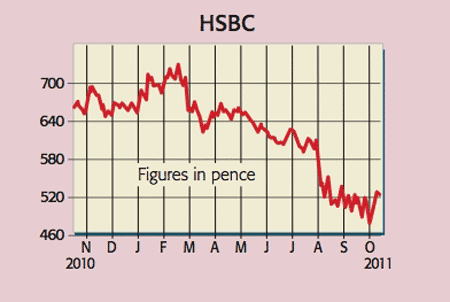Get the latest financial news, insights and expert analysis from our award-winning MoneyWeek team, to help you understand what really matters when it comes to your finances.
You are now subscribed
Your newsletter sign-up was successful
Want to add more newsletters?

Twice daily
MoneyWeek
Get the latest financial news, insights and expert analysis from our award-winning MoneyWeek team, to help you understand what really matters when it comes to your finances.

Four times a week
Look After My Bills
Sign up to our free money-saving newsletter, filled with the latest news and expert advice to help you find the best tips and deals for managing your bills. Start saving today!
HSBC (LSE: HSBA), rated a BUY by Socit Gnrale
Who would want to be a bank these days, attacked from all sides? Governments are tightening the regulatory screws with the Vickers report and Basel III, new taxes are being levied and America is trying to sue those who allegedly mis-sold mortgages to Fannie Mae and Freddie Mac. The economy isn't in good shape either. Franco-Belgian group Dexia has been broken up, credit ratings are being slashed and investment banking has hit the buffers.
Add in the odd rogue trading scandal (UBS's $2.3bn loss), and what's left is a total pig's ear. Not all banks, though, are the same. This is because corporations and consumers alike are wrenching their cash out of dodgy institutions and depositing funds into the few gold circle' players.
MoneyWeek
Subscribe to MoneyWeek today and get your first six magazine issues absolutely FREE

Sign up to Money Morning
Don't miss the latest investment and personal finances news, market analysis, plus money-saving tips with our free twice-daily newsletter
Don't miss the latest investment and personal finances news, market analysis, plus money-saving tips with our free twice-daily newsletter
The largest and best-capitalised operators, such as HSBC, are having a field day as the flight to quality accelerates. The world's local bank' has a core tier one ratio of 10.8%, a £90bn+ market cap, and a $1.3trn deposit base that is 25% larger than its loan book. This provides an excellent source of cheap funding, and sufficient ballast to survive the tightest of credit crunches.
Exposure to sovereign debt in Greece, Ireland, Portugal, Italy and Spain is relatively small at $8.2bn, representing around 6% of shareholders' funds. Most of HSBC's interests reside in emerging markets, with the crown jewel in Asia generating 60% of group profit in the first half of this year. Another 16% came from Latin America and the Middle East, with only 24% derived from Europe and North America.
Strategically, the board wants to get out of sub-scale activities. It's closing retail operations in Russia and Poland and selling three insurance units. It has jettisoned 195 non-strategic branches' in upstate New York for $1bn. The American credit-card business was off-loaded to Capital One for $2.6bn in September. Cost saving measures should help the company to maintain or even lift the return on equity from the current 12.3% to as much as 15%. The big unknown is whether Asia is heading for a soft or a hard landing. I side with the optimistists: the International Monetary Fund predicts healthy Chinese (9.0%) and Indian (7.5%) GDP growth in 2012.

The City expects 2011 sales and adjusted earnings per share (EPS) of £46.6bn and 59.5p respectively, rising to £48.6bn and 68.5p in 2012. This puts the shares on a frugal price/earnings ratio of nine, with a 4.5% yield. I rate HSBC on a multiple of 1.2 times net tangible assets, or 640p a share.
If the euro disintegrates, this could blow a mini-hole in the firm's capital ratios. Yet even here we'll soon see progress as euro politicians bite the bullet, flood the markets with cash and recapitalise the zombie' institutions.
So, despite uncertainty, HSBC looks well positioned to take advantage of the shift in economic power from West to East and should profit as weaker rivals crumble. Socit Gnrale has a price target of 700p. The next trading statement is due on 9 November.
Rating: BUY at 520p
Paul Hill also writes a weekly share-tipping newsletter, Precision Guided Investments. See www.moneyweek.com/PGI , or phone 020-7633 3634 for more information.
Get the latest financial news, insights and expert analysis from our award-winning MoneyWeek team, to help you understand what really matters when it comes to your finances.
Paul gained a degree in electrical engineering and went on to qualify as a chartered management accountant. He has extensive corporate finance and investment experience and is a member of the Securities Institute.
Over the past 16 years Paul has held top-level financial management and M&A roles for blue-chip companies such as O2, GKN and Unilever. He is now director of his own capital investment and consultancy firm, PMH Capital Limited.
Paul is an expert at analysing companies in new, fast-growing markets, and is an extremely shrewd stock-picker.
-
 New PM Sanae Takaichi has a mandate and a plan to boost Japan's economy
New PM Sanae Takaichi has a mandate and a plan to boost Japan's economyOpinion Markets applauded new prime minister Sanae Takaichi’s victory – and Japan's economy and stockmarket have further to climb, says Merryn Somerset Webb
-
 Plan 2 student loans: a tax on aspiration?
Plan 2 student loans: a tax on aspiration?The Plan 2 student loan system is not only unfair, but introduces perverse incentives that act as a brake on growth and productivity. Change is overdue, says Simon Wilson